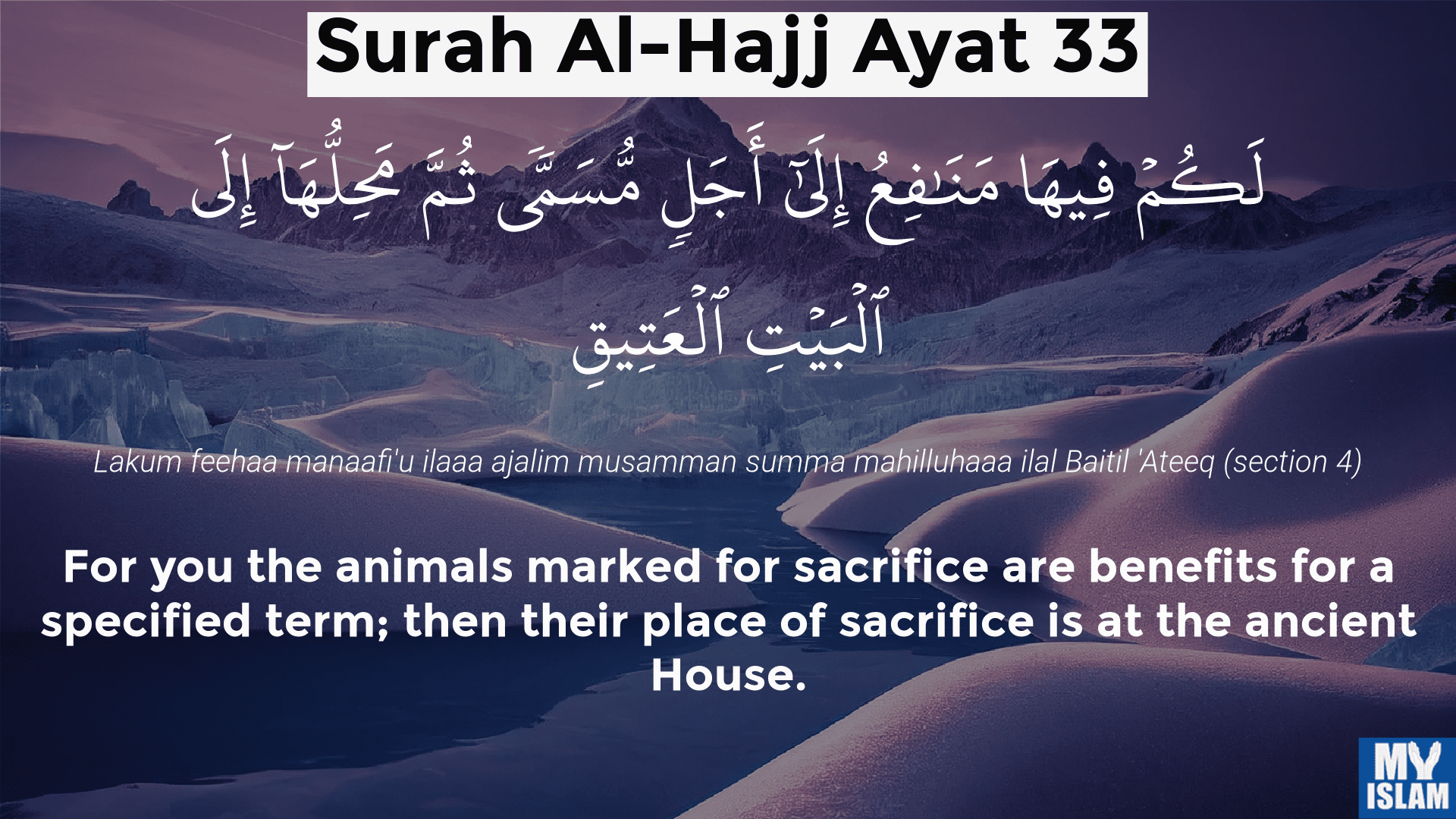Surah Hajj Ayat 32 in Arabic Text
English Translation
Here you can read various translations of verse 32
That [is so]. And whoever honors the symbols of Allah – indeed, it is from the piety of hearts.
Such (is his state): and whoever holds in honour the symbols of Allah, (in the sacrifice of animals), such (honour) should come truly from piety of heart.
Such is the fact. And whoso venerates the sanctity of all that have been ordained as symbols of Allah surely does so because it is part of the true piety of the hearts.
Thus it is [what has been mentioned in the above said Verses (27, 28, 29, 30, 31) is an obligation that mankind owes to Allah]. And whosoever honours the Symbols of Allah, then it is truly from the piety of the heart.
That (is the command). And whoso magnifieth the offerings consecrated to Allah, it surely is from devotion of the hearts,
That (is the Command); and whoever (constantly) magnifies the waymarks of Allah, then surely it is of the piety of the hearts.
All this [is ordained by God]: those who honour God’s rites show the piety of their hearts.
یہ سن لیا اب اور سنو! اللہ کی نشانیوں کی جو عزت وحرمت کرے اس کے دل کی پرہیز گاری کی وجہ سے یہ ہے
Quran 22 Verse 32 Explanation
For those looking for commentary to help with the understanding of Surah Hajj ayat 32, we’ve provided two Tafseer works below. The first is the tafseer of Abul Ala Maududi, the second is of Ibn Kathir.
Ala-Maududi
(22:32) Such is the fact. And whoso venerates the sanctity of all that have been ordained as symbols[60] of Allah surely does so because it is part of the true piety of the hearts.[61]
60. “Symbols of Allah”: the performance of Salat, Hajj, Fasting, etc., or things like a Mosque or sacrificial offerings, etc. See (Surah Al-Maidah, Ayat 2) note 5-7 thereof.
61. That is, the observance of the sanctity of the symbols by a man is a proof that there is piety in his heart. On the other hand, the man who violates their sanctity proves himself to be void of piety and fear of God. It shows that he either does not believe at all in Allah or adopts a rebellious attitude against Him.
Ibn-Kathir
32. Thus it is, and whosoever honors the Sha`a’ir of Allah, then it is truly from the Taqwa of the hearts. 33. In them are benefits for you for an appointed term, and afterwards they are brought for sacrifice to the `Atiq House.
(and whosoever honors the Sha`a’ir of Allah,) means, His commands.
(then it is truly from the Taqwa of the hearts.) This also includes obeying His commands in the best way when it comes to offering sacrifices, as Al-Hakam said narrating from Miqsam, from Ibn `Abbas: “Honoring them means choosing fat, healthy animals (for sacrifice).” Abu Umamah bin Sahl said: “We used to fatten the Udhiyyah in Al-Madinah, and the Muslims used to fatten them.” This was recorded by Al-Bukhari. In Sunan Ibn Majah, it was recorded from Abu Rafi` that the Messenger of Allah sacrificed two castrated, fat, horned rams. Abu Dawud and Ibn Majah recorded from Jabir: “The Messenger of Allah sacrificed two castrated, fat, horned rams.” It was said, “The Messenger of Allah commanded us to examine their eyes and ears, and not to sacrifice the Muqabilah, the Mudabirah, the Sharqa, nor the Kharqa’.” This was recorded by Ahmad and the Sunan compilers, and At-Tirmidhi graded it Sahih. As for the Muqabilah, it is the one whose ear is cut at the front, Mudabirah is the one whose ear is cut at the back, the Shurqa is the one whose ear is split, as Ash-Shafi`i said. The Kharqa’ is the one whose ear is pierced with a hole. And Allah knows best. It was recorded that Al-Bara’ said, “The Messenger of Allah said:
(Four are not permitted for sacrifice: those that are obviously one-eyed, those that are obviously sick, those that are obviously lame and those that have broken bones, which no one would choose.) This was recorded by Ahmad and the Sunan compilers, and At-Tirmidhi graded it Sahih.
(In them are benefits for you) meaning, in the Budn (sacrificial camels) you find benefits such as their milk their wool and hair, and their use for riding.
(In them are benefits for you for an appointed term,) Miqsam reported that Ibn `Abbas said: “Until you decide to offer them as a sacrifice.” It was recorded in the Two Sahihs from Anas that the Messenger of Allah saw a man driving his sacrificial camel and said,
(Ride it.) The man said, “It is a sacrificial camel.” He said,
(Ride it, woe to you!) the second or third time. According to a report recorded by Muslim from Jabir, the Messenger of Allah said:
(Ride it gently accor- ding to your needs.)
(and afterwards they are brought for sacrifice to the `Atiq House.) meaning, they are eventually brought to the `Atiq House — which is the Ka`bah — as Allah says:
(an offering, brought to the Ka`bah) ﴿5:95﴾
(and detained the Hady, from reaching their place of sacrifice) ﴿48:25﴾
Quick navigation links






